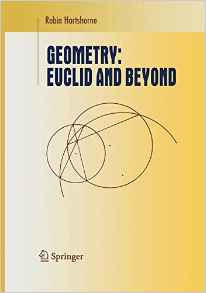|
Home
Syllabus
Lecture Topics
Homework
Policies
|
|
Math 3210-001:
Euclidean and Non-Euclidean Geometry,
Spring 2017
|
|
Syllabus
|
|
|
Course description:
From the catalogue:
Axiomatic systems;
Euclid's presentation of the elements of geometry;
Hilbert's axioms; neutral, Euclidean and
non-Euclidean geometries and their models.
|
Prerequisites:
Requires prerequisite courses of MATH 2001 and MATH 3130
or MATH 3135 (all minimum grade C-).
|

|
Text:
Geometry: Euclid and Beyond,
by Robin Hartshorne (2000).
You can obtain an electronic copy of this book
by visiting Chinook: The University of Colorado Boulder Libraries Catalog,
and typing ``Geometry: Euclid and beyond by Hartshorne'' in the search bar.
The first result gives you the
Springerlink to the book. If you are doing
this from on campus or through VPN, you can download the PDF of the book.
Euclid's elements.
Hilbert's Foundations of Geometry
|
Homework, Quizzes and Exams:
During the semester there will be
regularly assigned homework and quizzes, one midterm and
a final exam. Your course grade will be
computed according to the formula:
Grade = HW(30%) + Quiz(20%) + Mid(20%) + Final(30%).
You must take the final exam to pass the course.
Late homework will not be accepted and missed quizzes
cannot be made up. However, I will not
count your two lowest homework scores nor your
two lowest quiz scores.
|
Grading:
You will be graded only on your written work.
This work will be judged on the basis of
correctness, completeness and legibility.
Strings of formulas without explanation will not be accepted.
Paragraph organization (where appropriate), complete sentences
and correct punctuation are expected.
|
Dates:
Homework: Usually due Wed
Quiz: Usually on Mon
Midterm: March 3 (in class)
Spring Break: March 27-31
Last Day: May 5
Final Exam: May 8, 7:30-10pm.
|
Getting Help:
Don't wait until it is too late if you need help.
Ask questions! I am available
during the office hours listed
here and also at many other times.
If you can't see me during office hours, then make an appointment
with me to see me at a different time. I will also give short
answers to questions sent by email. It is also possible
to get help in the
Math Academic Resource Center.
|
WWW:
Information concerning our class will be posted
on my teaching web page under the link for
Teaching.
A copy of any document I hand out in class will be accessible
from this page.
|
Provost's Disability Task Force recommended syllabus statement:
If you qualify for accommodations because of a disability,
please submit to your
professor a letter from
Disability Services in a timely manner (for exam
accommodations provide your letter at least one week prior to the exam)
so that your needs can be addressed. Disability Services
determines accommodations
based on documented disabilities.
Contact Disability Services at 303-492-8671
or by e-mail at
dsinfo@colorado.edu.
If you have a temporary medical condition or injury, see
Temporary Injuries guidelines under the Quick Links at the
Disability Services website and discuss your needs with your professor.
|
Observance of Religious Holidays:
Campus policy regarding religious observances requires that faculty make
every effort to deal reasonably and fairly with all students who, because of
religious obligations, have conflicts with scheduled exams,
assignments or required attendance. In this class,
please inform me of any conflicts with scheduled exams,
assignments or required attendance at least two weeks in advance.
See the
campus policy regarding religious observances for full details.
|
Classroom behavior:
Students and faculty each have responsibility for maintaining
an appropriate learning environment. Those who fail to adhere
to such behavioral standards may be subject to discipline.
Professional courtesy and sensitivity are especially important
with respect to individuals and topics dealing with differences
of race, color, culture, religion, creed, politics, veteran's status,
sexual orientation, gender, gender identity and gender expression,
age, disability, and nationalities.
For more information, see the policies
on
classroom behavior and
the student code of conduct.
|
Sexual Misconduct, Discrimination, Harassment and/or Related Retaliation:
(The Office of Institutional Equity and Compliance (OIEC) recommends the following syllabus statement.)
The University of Colorado Boulder (CU Boulder) is committed to
maintaining a positive learning, working, and living environment.
CU Boulder will not tolerate acts of sexual misconduct, discrimination,
harassment or related retaliation against or by any employee or student.
CU's Sexual Misconduct Policy prohibits sexual assault,
sexual exploitation, sexual harassment, intimate partner abuse
(dating or domestic violence), stalking or related retaliation.
CU Boulder's Discrimination and Harassment Policy prohibits discrimination,
harassment or related retaliation based on race, color,
national origin, sex, pregnancy, age, disability, creed,
religion, sexual orientation, gender identity, gender expression,
veteran status, political affiliation or political philosophy.
Individuals who believe they have been subject to misconduct under
either policy should contact the Office of Institutional Equity and
Compliance (OIEC) at 303-492-2127. Information about the OIEC,
the above referenced policies, and the campus resources available
to assist individuals regarding sexual misconduct,
discrimination, harassment or related retaliation can be found at the
OIEC website.
|
The Honor Council recommended syllabus
statement:
All students enrolled in a University of Colorado Boulder
course are responsible for knowing and adhering to the
academic integrity policy
of the institution. Violations of the policy may include:
plagiarism, cheating, fabrication, lying, bribery, threat,
unauthorized access, clicker fraud, resubmission, and
aiding academic dishonesty. All incidents of academic
misconduct will be reported to the Honor
Code Council (303-735-2273; honor@colorado.edu).
Students who are found responsible for violating the academic
integrity policy will be subject to nonacademic
sanctions from the Honor Code Council as well as academic
sanctions from the faculty member. Additional information
regarding the academic integrity
policy can be found at
here.
|
|
|